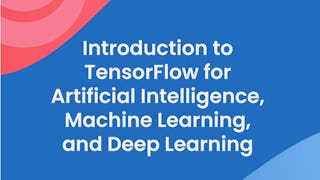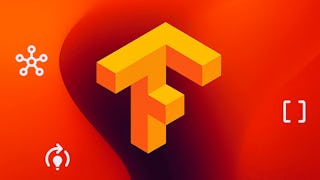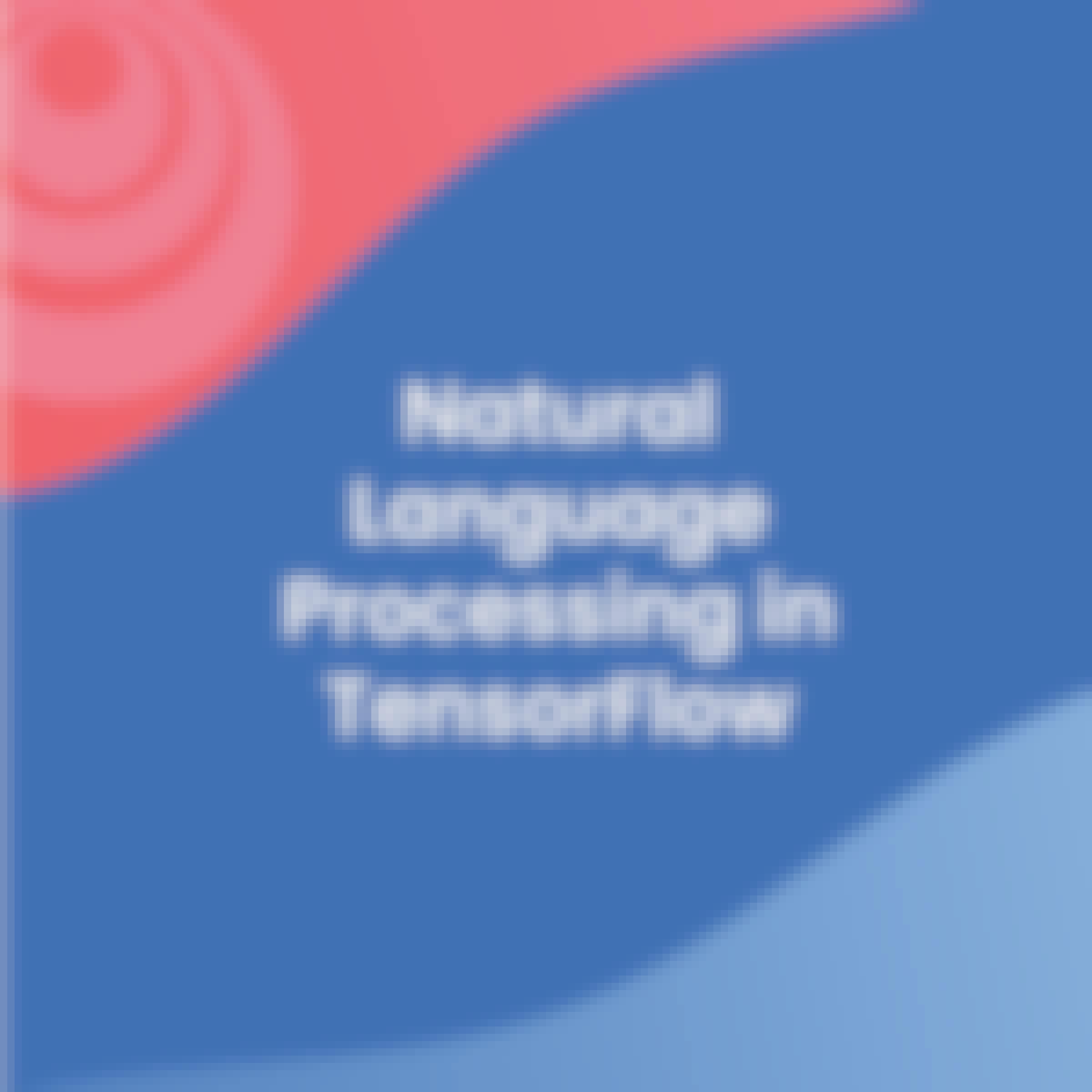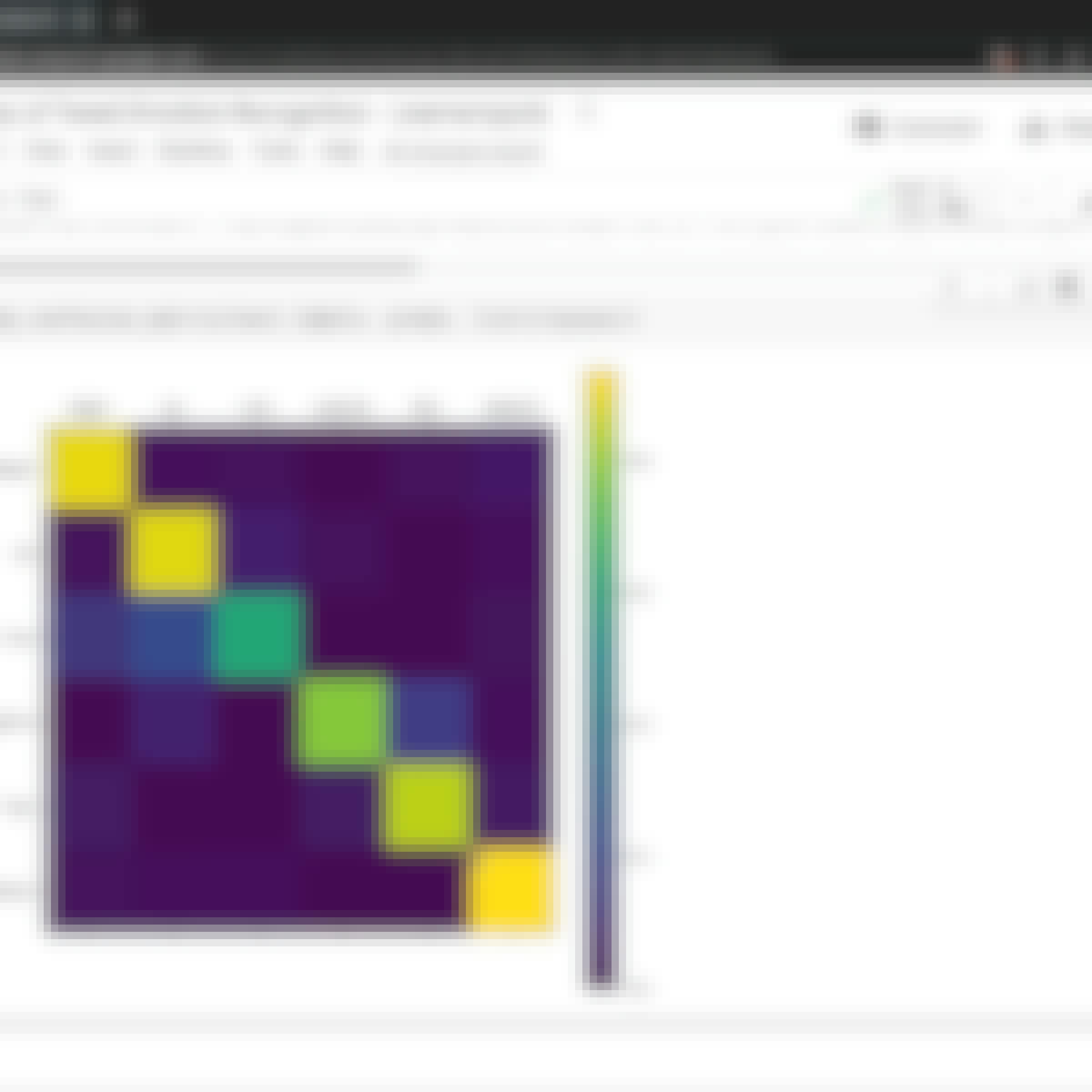- Browse
- Tensorflow
TensorFlow Courses Online
Master TensorFlow for deep learning. Learn to build, train, and deploy neural networks using TensorFlow.
Filter by
SubjectRequired *
LanguageRequired *
The language used throughout the course, in both instruction and assessments.
Learning ProductRequired *
LevelRequired *
DurationRequired *
SkillsRequired *
SubtitlesRequired *
EducatorRequired *
Explore the TensorFlow Course Catalog
 Status: Free TrialFree TrialD
Status: Free TrialFree TrialDDeepLearning.AI
Skills you'll gain: Tensorflow, Computer Vision, Image Analysis, Keras (Neural Network Library), Natural Language Processing, Time Series Analysis and Forecasting, Deep Learning, Artificial Neural Networks, Generative AI, Predictive Modeling, Applied Machine Learning, Artificial Intelligence and Machine Learning (AI/ML), Artificial Intelligence, Text Mining, Machine Learning Methods, Forecasting, Data Processing, Machine Learning, Supervised Learning
4.7·Rating, 4.7 out of 5 stars25K reviewsIntermediate · Professional Certificate · 3 - 6 Months
 Status: Free TrialFree TrialD
Status: Free TrialFree TrialDDeepLearning.AI
Skills you'll gain: Tensorflow, Computer Vision, Image Analysis, Keras (Neural Network Library), Deep Learning, Artificial Neural Networks, Artificial Intelligence, Machine Learning
4.8·Rating, 4.8 out of 5 stars20K reviewsIntermediate · Course · 1 - 4 Weeks
 Status: NewNewStatus: Free TrialFree Trial
Status: NewNewStatus: Free TrialFree TrialSkills you'll gain: Keras (Neural Network Library), Image Analysis, Deep Learning, Artificial Neural Networks, Tensorflow, Data Processing, Computer Vision, Data Transformation, Financial Forecasting, Applied Machine Learning, Feature Engineering, Artificial Intelligence and Machine Learning (AI/ML), Data Visualization, Time Series Analysis and Forecasting, Exploratory Data Analysis, Python Programming, Customer Analysis, Predictive Modeling, Google Cloud Platform, Development Environment
Beginner · Specialization · 1 - 3 Months
 Status: Free TrialFree TrialStatus: AI skillsAI skills
Status: Free TrialFree TrialStatus: AI skillsAI skillsSkills you'll gain: PyTorch (Machine Learning Library), Keras (Neural Network Library), Deep Learning, Reinforcement Learning, Unsupervised Learning, Artificial Neural Networks, Machine Learning Methods, Generative AI, Tensorflow, Artificial Intelligence and Machine Learning (AI/ML), Image Analysis, Computer Vision, Statistical Modeling, Artificial Intelligence, Geospatial Information and Technology, Machine Learning, Regression Analysis, Data Pipelines, Network Architecture, Network Model
4.5·Rating, 4.5 out of 5 stars4.1K reviewsIntermediate · Professional Certificate · 3 - 6 Months
 Status: Free TrialFree TrialD
Status: Free TrialFree TrialDDeepLearning.AI
Skills you'll gain: Generative AI, Tensorflow, Computer Vision, Image Analysis, Generative Model Architectures, Deep Learning, Keras (Neural Network Library), Artificial Neural Networks, Distributed Computing, Unsupervised Learning, Network Model, Performance Tuning, NumPy, Object Oriented Programming (OOP), Heat Maps, Network Architecture
4.8·Rating, 4.8 out of 5 stars1.7K reviewsIntermediate · Specialization · 3 - 6 Months
 Status: Free TrialFree TrialI
Status: Free TrialFree TrialIImperial College London
Skills you'll gain: Tensorflow, Generative Model Architectures, Data Pipelines, Keras (Neural Network Library), Deep Learning, Image Analysis, Computer Programming, Program Development, Data Validation, Applied Machine Learning, Bayesian Statistics, Supervised Learning, Natural Language Processing, Data Processing, Predictive Modeling, Computer Vision, Machine Learning Methods, Artificial Neural Networks, Machine Learning, Unsupervised Learning
4.8·Rating, 4.8 out of 5 stars717 reviewsIntermediate · Specialization · 3 - 6 Months
What brings you to Coursera today?
 Status: NewNewStatus: Free TrialFree Trial
Status: NewNewStatus: Free TrialFree TrialSkills you'll gain: Tensorflow, Artificial Neural Networks, Keras (Neural Network Library), Deep Learning, Time Series Analysis and Forecasting, Image Analysis, Natural Language Processing, Computer Vision, Forecasting, Classification And Regression Tree (CART), Supervised Learning, Machine Learning, Text Mining, Predictive Analytics, NumPy, Network Architecture, Data Processing, Data Science
Intermediate · Specialization · 1 - 3 Months
 Status: Free TrialFree TrialD
Status: Free TrialFree TrialDDeepLearning.AI
Skills you'll gain: Tensorflow, Natural Language Processing, Generative AI, Deep Learning, Artificial Intelligence and Machine Learning (AI/ML), Artificial Neural Networks, Text Mining, Applied Machine Learning, Machine Learning
4.6·Rating, 4.6 out of 5 stars6.5K reviewsIntermediate · Course · 1 - 4 Weeks

Skills you'll gain: Tensorflow, Google Cloud Platform, Scripting, Artificial Neural Networks, Machine Learning, Deep Learning, Cloud Computing, Development Environment
4·Rating, 4 out of 5 stars20 reviewsBeginner · Project · Less Than 2 Hours
 Status: Free TrialFree Trial
Status: Free TrialFree TrialSkills you'll gain: Keras (Neural Network Library), Reinforcement Learning, Unsupervised Learning, Deep Learning, Tensorflow, Machine Learning Methods, Generative AI, Artificial Neural Networks, Artificial Intelligence and Machine Learning (AI/ML), Artificial Intelligence, Natural Language Processing, Performance Tuning
4.4·Rating, 4.4 out of 5 stars1K reviewsIntermediate · Course · 1 - 3 Months
 Status: NewNewStatus: PreviewPreview
Status: NewNewStatus: PreviewPreviewSkills you'll gain: Tensorflow, Scikit Learn (Machine Learning Library), Machine Learning, Feature Engineering, Deep Learning, Matplotlib, Jupyter, Python Programming, Data Processing, NumPy, Data Cleansing, Image Analysis, Artificial Neural Networks, Seaborn, Development Environment, Pandas (Python Package), Regression Analysis
Mixed · Course · 1 - 3 Months

Skills you'll gain: Tensorflow, Python Programming, Natural Language Processing, Artificial Neural Networks, Text Mining, Machine Learning Algorithms, Deep Learning, Machine Learning, Data Processing
4.5·Rating, 4.5 out of 5 stars170 reviewsIntermediate · Guided Project · Less Than 2 Hours
In summary, here are 10 of our most popular tensorflow courses
- DeepLearning.AI TensorFlow Developer: DeepLearning.AI
- Introduction to TensorFlow for Artificial Intelligence, Machine Learning, and Deep Learning: DeepLearning.AI
- Deep Learning with Python: CNN, ANN & RNN: EDUCBA
- IBM Deep Learning with PyTorch, Keras and Tensorflow: IBM
- TensorFlow: Advanced Techniques: DeepLearning.AI
- TensorFlow 2 for Deep Learning: Imperial College London
- Deep Learning with TensorFlow: Packt
- Natural Language Processing in TensorFlow: DeepLearning.AI
- Learning TensorFlow: the Hello World of Machine Learning: Google Cloud
- Deep Learning with Keras and Tensorflow: IBM
Frequently Asked Questions about Tensorflow
TensorFlow is an open-source framework for machine learning (ML) programming originally created by Google Brain, Google’s deep learning and artificial intelligence (AI) research team. It has become one of the most popular software platforms for machine learning due to its flexibility and a comprehensive ecosystem of tools and resources. For example, TensorFlow.js allows for JavaScript-based ML applications that can run in browsers; TensorFlow Lite can run on mobile devices for federated learning applications; and TensorFlow Hub provides an extensive library of reusable ML models.
The flexibility of TensorFlow and breadth of its machine learning applications have been important in enabling a wide range of uses. TensorFlow is frequently used for computer vision applications, including facial recognition in social media, automatic X-ray scanning in healthcare, and autonomous vehicle driving. Similarly, natural language processing (NLP) applications can understand and respond to spoken and written text, making possible the creation of helpful chatbots and other digital agents as well as the automatic reading and summarization of text. Recommendation engines used by music streaming services and online retailers may also be built in TensorFlow.
These are all just a few examples of the power of machine learning applications and the ways that TensorFlow can be leveraged to enable them. If you’re interested in pushing the boundaries of this fast-changing field even further, learning TensorFlow is essential.
Expertise in TensorFlow is an extremely valuable addition to your skillset, and can open the door to many exciting careers. As one of the most popular and useful platforms for machine learning and deep learning applications, TensorFlow skills are in demand from companies throughout the tech world, as well as in the automotive industry, medicine, robotics, and other fields. This high level of demand for skills in TensorFlow and machine learning translates into high levels of pay; according to Glassdoor, machine learning engineers in America earn an average salary of $114,121.
Absolutely - in fact, Coursera is one of the best places to learn TensorFlow skills online. You can take individual courses as well as Specializations spanning multiple courses from deeplearning.ai, one of the pioneers in the field, or Google Cloud, an industry leader. You can also take courses from top-ranked universities from around the world, including Imperial College London and National Research University Higher School of Economics. Guided Projects from Coursera offer another way to learn, with hands-on Tensorflow tutorials presented by experienced instructors.
You need to have a basic understanding of Python before starting to learn TensorFlow, so it's best to start with an introductory course to this programming language first. Python is the language used to design TensorFlow. It's also helpful to have knowledge of artificial intelligence (AI) concepts as well. You should have strong math skills, especially in algebra so that you'll be familiar with the calculations and algorithms required in TensorFlow. Foundational knowledge of vectors, scalars, and matrices is also very helpful as you start learning TensorFlow, as well as basic statistics. And it's important to know the basics of machine learning as well.
People who are best suited for roles in TensorFlow have an interest in machine learning or deep learning. Important soft skills include communication skills, problem-solving skills, time management, teamwork, and a thirst for learning. Someone who uses TensorFlow in their job likely works with a team of professionals like software engineers, research scientists, marketing teams, data scientists, and product teams, so they must be able to communicate clearly, prioritize tasks, and work toward a common goal. And since fields that use TensorFlow—such as AI, machine learning, and deep learning—are constantly evolving, people who adapt well to change and are eager to learn or develop the next new technology are well suited for these roles.
If you are currently in the machine learning field or aspire to be, learning about TensorFlow is most likely right for you. The same applies if you want to enter the deep learning field in positions like deep learning scientist, deep learning software engineer, or deep learning researcher since TensorFlow is a good starting point for deep learning. If you're in a deep learning internship, learning TensorFlow is right for you as well.
Online TensorFlow courses offer a convenient and flexible way to enhance your knowledge or learn new TensorFlow skills. Choose from a wide range of TensorFlow courses offered by top universities and industry leaders tailored to various skill levels.
When looking to enhance your workforce's skills in TensorFlow, it's crucial to select a course that aligns with their current abilities and learning objectives. Our Skills Dashboard is an invaluable tool for identifying skill gaps and choosing the most appropriate course for effective upskilling. For a comprehensive understanding of how our courses can benefit your employees, explore the enterprise solutions we offer. Discover more about our tailored programs at Coursera for Business here.










